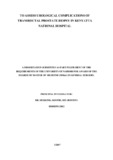To Assess Urological Complications of Transrectal Prostate Biopsy in Kenyatta National Hospital
Abstract
The definative diagnosis of prostate cancer is histopatholological proof of neoplastic changes in prostate biopsies. TRUS(Transrectal Ultrasound) guided prostate biopsy is the recommended mode of diagnosis, however in our set up finger guided biopsy remains the most common modality used. Prostate biopsy is a minimally invasive procedure, that is generally performed as an outpatient procedure. The operative complications vary from minor to life threatening, which include infection, bleeding, and urinary retention. Therefore the aim of this study was to assess the complications among patients who underwent transrectal prostate biopsy at Kenyatta National Hospital, and thus form a basis for prophylaxis and treatment.
OBJECTIVE
To assess complications among patients undergoing transrectal prostate biopsy at Kenyatta National Hospital.
STUDY DESIGN
A cross sectional study
SETTING
Kenyatta National Hospital, Minor Theatre and Radiology Department.
PATIENTS AND METHODS
The study was conducted between June 2016 and May 2017, it involved 72 patients with suspected prostate cancer undergoing transrectal prostate biopsy at Kenyatta National Hospital who met the inclusion criteria and gave informed consent . Sample size was achieved by non randomized consecutive sampling.
Patients were followed up postoperatively from day 0 to 14. The presence of the following complications were assessed; infection, bleeding and urinary retention.
RESULTS AND ANALYSIS
Seventy-two patients were recruited into the study. The mean age of males undergoing transrectal prostate biopsy was 71.8 years with a range of 47 to 94 years. Out of the 72 participants, 43 (59.7%) were aged 70 years and above. There were 13 patients with comorbid conditions; hypertension 8 (11.1%) and diabetes 5 (6.9%). The overall rate of transrectal prostate biopsy complications was 62.5 with 32 patients reporting at least one of the complications associated with the procedure. Complications included: haematochezia (31.9%), Urinary tract infection (UTI) (15.3%), orchitis(2.8) and haematuria (12.5%). There were no cases of haematospermia, or urine retention following the procedure. All the complications were self limiting and patients were followed up in the outpatient clinic. All patients made a full recovery within a period of 2 weeks and non required hospital admission.
Data collected was entered and analyzed using Statistical Package for Social Sciences (SPSS) for Windows Version 21. P values were generated using t test for means and x2 for comparison of proportions. Results were presented in tables, charts and graphs
CONCLUSION,
The results of our study indicated that transrectal prostate biopsy is associated with 62.5% minor complications. Despite the complications, transrectal prostate needle biopsy is a feasible and effective tool in male patients with suspected prostate cancer and can be performed safely in outpatient or office setting. The size of prostate, number of cores, IPSS score, exposure to antibiotics and patient demographics are not risk factors for post-biopsy complications
Publisher
University of Nairobi
Rights
Attribution-NonCommercial-NoDerivs 3.0 United StatesUsage Rights
http://creativecommons.org/licenses/by-nc-nd/3.0/us/Collections
- Faculty of Health Sciences (FHS) [4558]
- Theses & Dissertations [241]
The following license files are associated with this item:


